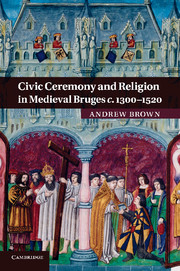Book contents
- Frontmatter
- Contents
- List of figures
- List of maps
- Acknowledgments
- List of abbreviations
- Note on currency and monies of account
- Introduction
- 1 The Holy Blood procession
- 2 General processions
- 3 Feast days and liturgical commemoration
- 4 Guilds: feast, festivity and public worship
- 5 Guilds and civic government
- 6 Civic charity
- 7 Civic ceremony, religion and the counts of Flanders
- Conclusion and epilogue: civic morality c. 1500
- Appendices
- Bibliography
- Index
4 - Guilds: feast, festivity and public worship
Published online by Cambridge University Press: 03 May 2011
- Frontmatter
- Contents
- List of figures
- List of maps
- Acknowledgments
- List of abbreviations
- Note on currency and monies of account
- Introduction
- 1 The Holy Blood procession
- 2 General processions
- 3 Feast days and liturgical commemoration
- 4 Guilds: feast, festivity and public worship
- 5 Guilds and civic government
- 6 Civic charity
- 7 Civic ceremony, religion and the counts of Flanders
- Conclusion and epilogue: civic morality c. 1500
- Appendices
- Bibliography
- Index
Summary
When the town council requested in 1419 that Holy Blood day be elevated in St Donatian's to a ‘great double’, it was aware that Holy Trinity day had already been given a similar rank. This had been the result of investment by a particular guild. In 1403, the canons had accepted a major foundation to build a new chapel at the northern end of the church. The endowment allowed over £50 parisis to be spent on two chaplains to celebrate daily mass in perpetuity, and on enhancing Holy Trinity day with lights, ornaments and bell-ringing (as on the feast of St Donatian). The foundation had come from a guild dedicated to the Trinity: its six governors in 1403 had served or were still serving on the town council, all as burgomasters.
Membership lists for the guild do not survive, and little is known about its activities. The same is mostly true of the 200 or so guilds whose presence can be detected, sometimes only fleetingly, in surviving records between the late thirteenth and early sixteenth centuries. Most were not as socially distinguished or lavishly endowed as the Trinity guild, but virtually all provided intercession for the souls of their members under the patronage of particular saints. Their sheer number alone underscores their significance in the social and religious life of the town. It is their significance to ‘civic religion’ that is dealt with here, and this along two lines of inquiry.
- Type
- Chapter
- Information
- Civic Ceremony and Religion in Medieval Bruges c.1300–1520 , pp. 133 - 166Publisher: Cambridge University PressPrint publication year: 2011



